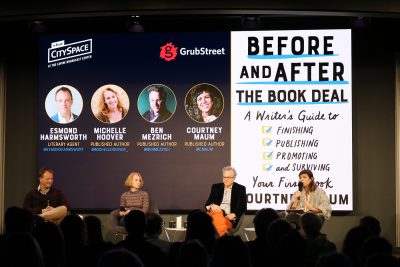Today’s publishing industry reeks with desperate competition. In a typical month, literary agent Esmond Harmsworth receives over 400 queries and manuscript samples from aspiring novelists. He’ll pick around 10.

“I have received some [queries] that appear to be written in blood. I received a long correspondence written by a zombie [character], who wrote over several weeks,” Harmsworth said at the event when recounting a few of the many “silly” queries he has received.
Aspiring writers received advice in making an agent’s short list and navigating a book deal in a panel at WBUR’s CitySpace Tuesday, moderated by four-time author Courtney Maum. Based off of her newest book titled “Before and After the Book Deal,” Maum discussed how to navigate the world of publishing.
Maum invited Harmsworth, along with authors Michelle Hoover and Ben Mezrich to give the audience a diverse taste of perspectives. Panelists discussed topics ranging from the benefits of an agent, mistakes the panelists have made in their own careers and finding an agent or publishing company.
“[This panel] is a fun way to replicate what I’m trying to do with the book,” Maum said in an interview, “and talk about publishing in a way that’s hopefully more open and candid than in the past.”
Maum’s book, published on Jan. 7, confers about emotional milestones and unspoken rules that accompany a book deal, such as money, etiquette, time management and rejection. She said she wrote this “exhaustive” guide as she felt no one else had written about what an author should do after landing a book deal.
“No one’s giving you a timeline of ‘This is when you’re going to start to really doubt yourself, this is when the best of the year lists are going to hit and make you hate yourself, this is when you find out your best friends just sold an option to a movie and you didn’t,’” Maum said. “These emotional and psychosomatic milestones are not addressed and unfortunately, it can completely derail someone’s career.”
Historical fiction author Hoover said it takes “patience, humility and emotional sensibility” to successfully write a novel, and that people often underestimate its challenges.
“I don’t think they realize how difficult it is to write a book. I mean, some people work for years,” Hoover said. “You might have written the whole book [of] 300, 400 pages, for the first draft, and only keep five pages as you go into the next revision.”
Negative feedback was a common roadblock all panelists said they had faced. Many recounted personal experiences of rejection that they said stalled their confidence.
“Regardless of the level at which you’re publishing,” Maum said at the event, “everyone goes through the same experience of having something that was deeply, deeply private for a long time, become public in a way that no one has prepared you for.”
Mezrich, author of 20 books and writer for TV show “Billions,” said he burrowed up in a Boston apartment after graduating college and wrote nine novels in nine months. After sending off his abundant work, he received 190 rejection slips.
When Mezrich finally did get published, he said success didn’t happen instantly, but encouraged the audience to laugh off the criticism.
“My first New York Times review, the first line was, ‘This is a bad book,’” Mezrich said at the event. “If you get your book published, you should enjoy the bad reviews as much as the good reviews.”
Hoover said she believes it takes 10 years in the industry to feel sufficient. Passion, she said, makes it worth it.
“You really have to be passionate for it, and you really have to be ready to do the work and know that you’re not going to get the accolades and interest for a very long time,” Hoover said in an interview.
Maum said to the audience that although monetary success can seem exciting, true success comes not from clinging to it, but from finding fulfillment in interacting with others.
“People think about success as like making a bestseller list or something like that,” Maum said, “but ultimately, things that you could hold on to and that really matter are these human interactions.”
Selena Lin, a sophomore in the College of Arts and Sciences, said that as an aspiring novelist, she attended the event to gain insight into her future field and appreciated the candid discussion.
“They were really honest and didn’t sugarcoat a lot of the stuff,” Lin said. “They’re positive, they’re hopeful, but they’re also not false.”


















































































































